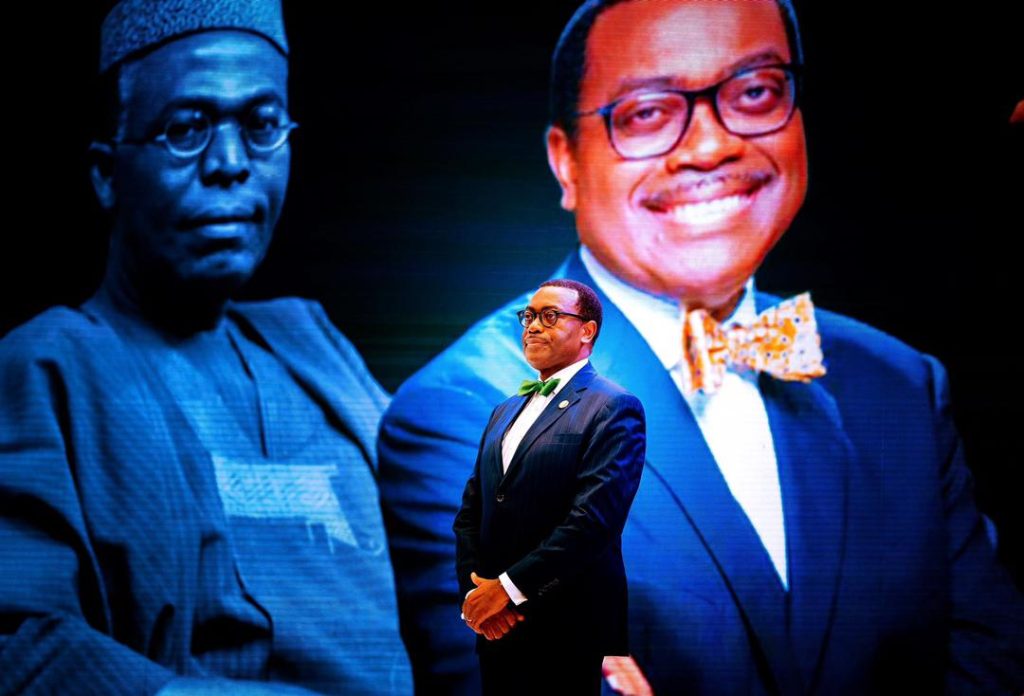- By Femi Alabi
President of Africa Development Bank (AfDB), Akinwunmi Adesina has said that the Premier of the defunct Western Region of Nigeria, Obafemi Awolowo remains the pacesetter and forerunner for development in Africa.
Adesina made the remark when he received the 2023 award of Obafemi Awolowo Prize for Leadership, on Wednesday in Lagos.
The event coincided with the 115th posthumous birthday anniversary of Awolowo and 37 years after his death.
Adesina, who became the fourth recipient of the award, noted that, as a teenage follower of Awolowo, he promised himself to follow the footsteps of the late premier, if he ever got into public office.
According to him, growing up in the old western region in the 1960s, only one name was synonymous with people-centred development: Awolowo.
“We lived in the same community as the sage, in Okebola, Ibadan. As a young child, passing by the frontage of his house was a favourite pastime.
“I remember peering over its low walls, to see if I could just catch a glimpse of the man who transformed the lives of millions in the then western region.
“My father was enamoured by Chief Awolowo; he devoured his books, writings and articles. The name ‘Awolowo’ was a constant guidepost for every discussion in our home.
“So much was the admiration that when I was 19 years old and Chief Awolowo ran for President under the Unity Party of Nigeria in 1979, myself and a close friend desperately wanted to simply catch a glimpse of him,”.
Adesina, a former Minister of Agriculture and Rural Development in Nigeria, said Awolowo’s intellectual capacity, vision, and pragmatic social welfarism, helped him accomplish what was seemingly unimaginable at the time.
“I dare say that Chief Awolowo implemented the sustainable development goals decades long before the phrase was coined.
“He was an inspiration for Africa, far beyond the shores of Nigeria. His philosophy, ‘Awoism’, was studied globally and helped shape programmes and policies in other countries,” Adeshina said.
Adesina, in his lecture, titled: ‘Making a New Nigeria: Welfarist Policies and People-Centered Development’, said he was influenced by the same drive as Awolowo.
READ ALSO:
Tinubu Congratulates Adesina On Awolowo Leadership Award
Shettima Renders Poetic Tribute, Calls Wigwe ‘a Divine Miracle’
Breaking! Tinubu Signs Executive Orders to Reposition Oil and Gas Sector
He listed four cardinal objectives as steps toward a better Nigeria and by extension Africa.
They are rural economic transformation and food security; health care security for all; and education for all.
Others are access to affordable housing for all and government accountability and fiscal decentralisation for true federalism.
The AfDB president said that in Nigeria, the bank is developing the zones in eight states with 518 million dollars, adding that the second phase of the programme in Nigeria, which would cover 23 more states, would be financed with one billion dollars.
According to him, the bank and partners recently launched a three-billion-dollar Alliance for Special Agro-Industrial Processing Zones.
The event was graced by former heads of state from within and outside Nigeria, state governors, royal fathers and other distinguished Nigerians.
Earlier, in her welcome address, Dr Olatokunbo Dosumu, Executive Director, Obafemi Awolowo Foundation, said that Adesina’s nomination was supported by global icons including former British Prime Minister, Sir Tony Blair; former United Nations Secretary-General, Mr Ban Ki-Moon; and Global Center on Adaptation Chief Executive Officer, Patrick Verkooijen, among others.
According to her, Ki-moon and Verkooijen jointly affirmed that they could not think of any person more highly qualified or deserving of the prestigious award other than Adesina who they declared is forged in the same mould as Chief Obafemi Awolowo.
Present at the event were former Presidents, Olusegun Obasanjo and Goodluck Jonathan, while President Bola Tinubu was represented by Vice President Kashim Shettima.
The governors at the event were Babajide Sanwo-Olu (Lagos), Alex Otti (Abia), Dapo Abiodun (Ogun), Usman Ododo (Kogi), and Mohammed Bago (Niger), amongst others.


